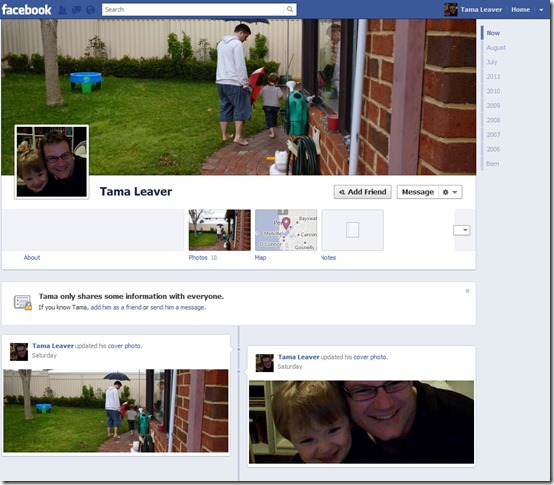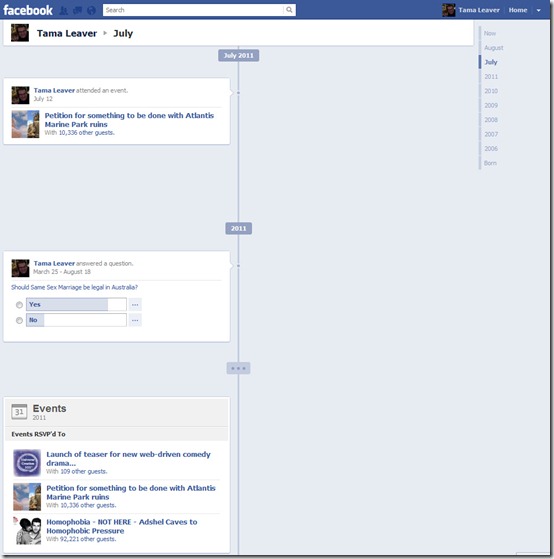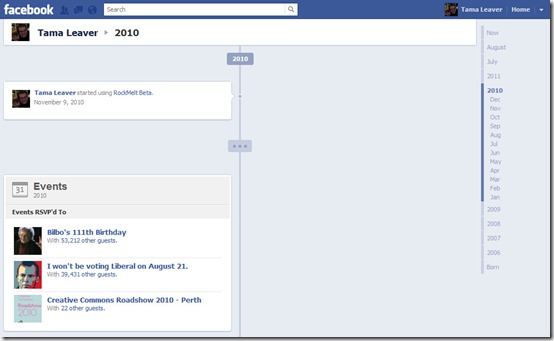Home » Posts tagged 'public'
Tag Archives: public
Facebook’s New Timeline & Perceptions of Privacy
Everyone’s Facebook profile will disappear in 6 October 2011, December 2011 replaced with a Timeline. Here are my thoughts and concerns about that Timeline, and some suggestions about managing your Timeline when it arrives …
I’ve been testing out Facebook’s new Timeline which will shortly replace profiles for all 800 million Facebook users. I have some concerns which I’ll outline in a minute, but I have to give credit where credit is due: Timeline looks amazing. I think this is the first time Facebook has stopped looking like a direct descendant of the profiles found on online dating websites! The new cover image, which is separate from your avatar or profile picture, stretches across the entire screen and is much more richly visual experience, combined with far better navigation tools for exploring the entirety of someone’s Facebook history, not just their current statuses and photos. Here’s what the top of my Timeline looks like:
The tools which allow you to emphasise certain events on your timeline let individuals build an engaging and carefully curated story of themselves. And in a move which deliberately situates Facebook as telling the story of your life, Timeline actively encourages users to add in missing details. When I look at the notification of my 2000 university graduation, Timeline suggests I add to the story and post a picture, enriching the tale visually. If I add a picture, then the event ‘looks’ more interesting and is more engaging than a bit of text in an ‘Info’ box. However, in moving from being primarily about current communication to adding the archival/historical emphasis, a number of privacy-related issues arise.
My Timeline image above is missing a lot of detail since it’s the view that the public can see – ie someone who I’m not connecting to at all – and my privacy settings are high (almost everything is ‘Friends Only’; incidentally, once your Timeline is visible you can use the right-hand setting indicator – the one that looks like a wheel – and select ‘View as …’ to check how your Timeline will look to anyone else, including the public view). It’s notable, then, that the cover photo — the big one, at the top of your Timeline, which isn’t your profile photo — joins your profile photo as an image that you can’t make private; if you can be found on Facebook, it’s there. (I presume this might disappear if you prevented your profile being found in searches, but I can’t say that definitively.) Profile pictures have been unavoidably public for a while, so we just need to remember this about cover photos, too.
If you scroll down my Timeline (which, as I said, is now absurdly easy with the right hand date-based navigation tools) this is what you can see for 2011 and 2010 (there’s not much there, but take a look at what is visible):
On some abstract level, I was aware that when I ‘voted’ or clicked ‘Attending’ I was committing to something that was visible beyond my immediate ‘friend’ network (notable for me since, due to my privacy settings, not much else is). However, most of these actions or events had, from my perspective, long since ‘disappeared’ to the extent that, in order to find them, someone would have to click to ‘load more’ on my Facebook profile page 20 times or more to see anything. Timeline changes that. Now my voting and the public events I attended are very prominent since that’s pretty much the only thing public. And while these were largely very quick responses, these little bits of information suddenly ‘say’ a great deal about me; indeed, for the public, these are the main bits of the story Facebook tells about me.
Now, some of the things I’ve said I’ve attended are pretty trivial, but some are political (it’s very clear what my political views are) and others are on the boundary of personal and political. When I voted ‘Yes’ to ‘Should Same Sex Marriage Be Legal In Australia’ I was stating something publicly, but I’d never considered that my response would be so prominent on Facebook (it wasn’t on my profile page very long, for example). Now, for me, this isn’t a big issue; I’ve got sufficient workplace security that I can’t imagine these views would jeopardise my employment, and I stand by my politics proudly. I suspect, though, this won’t be the case for everyone. I can think of numerous scenarios where this information might be misused by other people and I strongly recommend folks take a look at their Timeline view from the public perspective as soon as it’s available to them.
From what I can see, it is possible to remove certain items from Timeline, or at least reduce their prominence, but you have to do it from your view (not the public view I used to generate the above images) so if you’re a prolific Facebook user, it’ll take a while to find these items and reduce their visibility.
Now, I’m not suggesting Facebook ‘made public’ something that was private. This information may have felt private, but that was based on use, not on a technical sense of security. Indeed, danah boyd expressed this problem in her paper ‘Facebook’s Privacy Trainwreck: Exposure, Invasion, and Social Convergence’ explaining:
The tech world has a tendency to view the concept of ‘private’ as a single bit that is either 0 or 1. Data are either exposed or not. When companies make a decision to make data visible in a more ‘efficient’ manner, it is often startling, prompting users to speak of a disruption of ‘privacy’.
Technically, the information above was always public, but my experience of it meant it felt largely private. My example is extremely banal, but for other people, the sudden prominence of certain information may make it feel a lot more public than they ever intended. While I acknowledge Facebook has started to provide more robust privacy tools, I’ve seen nothing in the hype around Timeline to warn folks about the way their Timeline will tell a different story about them (and a different story to different people – your Friends will see one ‘you’, but the public may see a quite different one). If Facebook is going to be an ongoing repository, the always-being-edited ‘This Is Your Life’, then Facebook and those of us teaching about these tools need to ensure folks have a much better understanding about Timeline and similar changes. When your life story is a series of entries in a database, then the line between public and private is a single setting. However, that database, as we can see, can always be sorted, ordered and presented in very different ways.
Digital Culture Links: May 12th 2010
Links for May 10th 2010 through May 12th 2010:
- Show us the money! Oz Budget under CC [Creative Commons Australia] – Perhaps the only outstanding thing about the Australian budget was the licensing of it (congrats to CC Australia!): “In the debate over the merits of last night’s conservative budget, there’s one thing we’d argue Swan did get right – the licensing. The entire budget has been released under a Creative Commons Attribution licence. This means the material it contains – the deficit strategy, the fiscal aggregates, the government’s responses to the economic crisis – is all available for free reuse, by anyone, for any purpose, as long as the source is attributed. A single document, even one that’s 350 pages long, may not seem like that big a deal compared to some of the other open government initiatives over the last few years – like the release of the Australian Bureau of Statistic’s entire store of census data under CC. But as a public endorsement of CC as the licence of choice for the Australian Federal Government, it’s huge.”
- Roulette Russian: The teen-ager behind Chatroulette [The New Yorker] – A really odd feature from Julia Ioffe which is based on interviews with Andrey Ternovskiy, the Russian teenager who invented Chatroulette. Ioffe’s story is more about Ternovskiy leaving Russia for the US than anything else and it paints Chatroulette as a website built with equal parts of skill and naivete. It ends of a rather hollow note, implying that relationships built online are substantially less than ‘real’.
- Confusing *a* public with *the* public « BuzzMachine – Jeff Jarvis thinks ‘a public’ is a small group, while ‘the public’ is everyone; he think Facebook needs to think this, too: “I think Facebook’s problem lately with its disliked like button (and Google’s problem with the start of Buzz) is that they confuse the notion of the public sphere—that is, all of us—with the idea of making a public—that is, the small societies we create on Facebook or join on Twitter. Private v. public is not a binary decision; there is a vast middle inbetween that is about the control of our own publics. Allow me to explain…. […] That is, when I blog something, I am publishing it to the world for anyone and everyone to see: the more the better, is the assumption. But when I put something on Facebook my assumption had been that I was sharing it just with the public I created and control there. That public is private.”
- Obama stresses education over iPod, Xbox [Reuters] – “President Barack Obama told college graduates on Sunday the era of the iPod and the Xbox has not always been good for the cause of a strong education. Obama said today’s college graduates are coming of age at a time of great difficulty for the United States. They face a tough economy for jobs, two wars and a 24/7 media environment not always dedicated to the truth, he said. Added to the mix are the distractions offered by popular electronic devices that entertain millions of Americans. “With iPods and iPads; Xboxes and PlayStations — none of which I know how to work — information becomes a distraction, a diversion, a form of entertainment, rather than a tool of empowerment, rather than the means of emancipation,” Obama said.”
Annotated Digital Culture Links: April 24th 2009
Links for April 23rd 2009 through April 24th 2009:
- A little cynicism about the Susan Boyle phenomenon [Just TV] – Some useful points to think about in terms of the dramatic rise (or spread) of Susan Boyle, the Britain’s Got Talent competitor who has taken the internet by storm. Mittell asks why so few people are allowing for the possibility that Boyle’s appearance was more manufactured than it appeared – this is reality tv, after all!
- calling a customer a brat: twitter and the distinctions between public and private [jill/txt] – A cautionary tale: in Norway a teenager wrote on Twitter, complaining he couldn’t legally purchase a song in Norway which was available in the US. A Warner Brothers’ representative in Norway saw the tweet, and twittered back a response which basically called the teenager a brat and suggested (sarcastically) that he should just pirate it. The exchange was widely linked to, Warner Brothers had to issue a public apology. Jill notes this is a clear case of folks on Twitter not clearly understanding that it’s public space: “… if the record company exec had been talking to a journalist rather than firing off 140 characters from his sofa he would almost certainly not have called a would-be customer a brat. He would have moderated his tone and choice of words according to his awareness that he would be quoted.”
- Oprah effect: 43% jump in Twitter traffic – Technology Live [USATODAY.com] – “Oprah Winfrey’s effect on book sales when she supports a new title is legendary. She may have even contributed to the election of the nation’s first black president with her endorsement of Barack Obama. So what happened in Twitterland after Winfrey started Tweeting, and used her TV show as a platform to announce her online Twitter presence? According to market tracker Hitwise, traffic to Twitter went up 43% in a before and after survey of the Oprah Effect. Additionally, on April 17th, the day of Winfrey’s first Tweets, 37% of visits to Twitter.com were new visitors, Hitwise says. By comparison, Hitwise says Facebook’s ratio of new visitors in March were 8%.”



